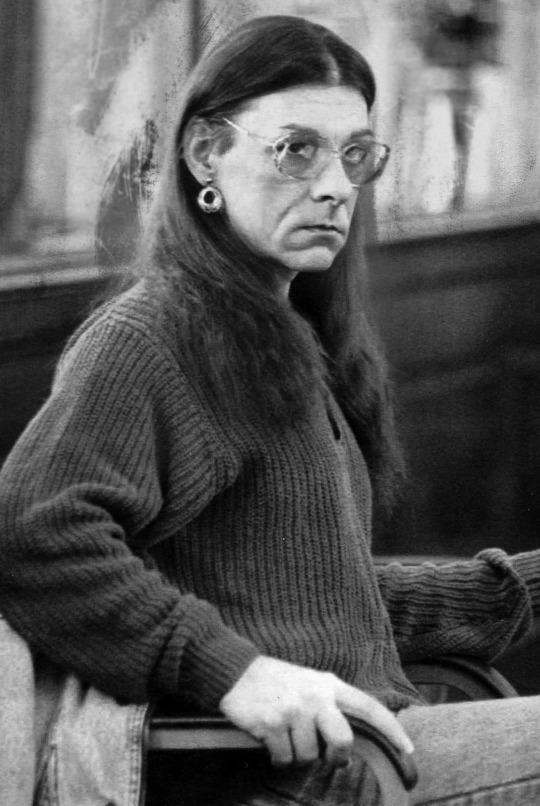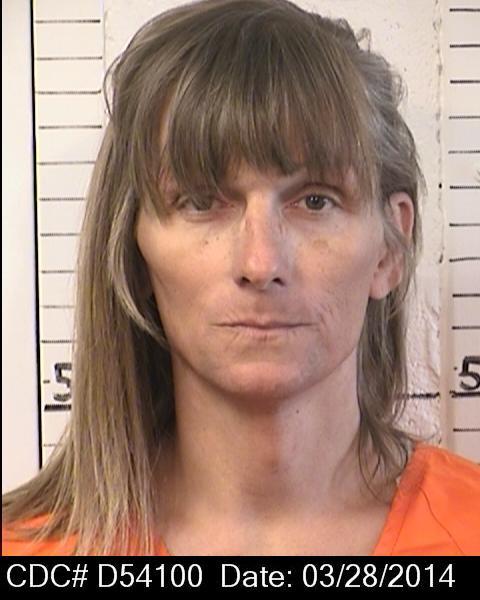Inmate Michelle-Lael Norsworthy smiles after a parole hearing at Mule Creek State Prison in Ione, Calif. She is locked in a legal battle with The California Department of Corrections and Rehabilitation over her request for sex reassignment surgery. (Photo: Steve Yeater/AP)
The Supreme Court will announce whether it has found a fundamental right to same-sex marriage any day now, dramatically altering the course of gay rights history. But a much lower-profile case that is currently wending its way up through the federal courts could offer the Supreme Court an opportunity for another potentially transformative decision on LGBT rights as soon as next year.
The case — about whether the California state prison system should be required to pay for an inmate’s sex reassignment surgery — may change public perceptions about medical care for transgender people at a time when Caitlyn Jenner and other high-profile trans people are lending more visibility to the group.
The gay rights movement has been breathtakingly successful at changing public perceptions about gay people in the country in only a few decades, in part because of a well-organized legal campaign to win the right to gay marriage. One successful feature of the campaign: sympathetic plaintiffs. But the transgender movement has always lagged a bit behind. One reason is that while most Americans now say they know a gay person, the vast majority does not know a trans person. That is beginning to change, according to polling by advocacy group the Human Rights Campaign. Twenty-two percent of likely voters now say they know a transgender person, a five percentage point jump from even just one year earlier. And that’s already affecting public perceptions: 44 percent said in January that they viewed trans people favorably, compared to just 26 percent in 2011. A big Supreme Court case could do a lot to boost those numbers by bringing even more awareness of transgender people.
The law on transgender issues is something of a Wild West — very few states make clear that the government will recognize a person’s post-transition gender, for example, and some states have explicitly passed laws refusing to acknowledge a trans resident’s gender, even after sex reassignment surgeries. The Supreme Court has declined to wade into case after case affecting transgender people — including job discrimination cases. But this could all change soon.
In August, the U.S. Court of Appeals for the 9th Circuit Court will hear arguments in a case centering around Michelle-Lael Norsworthy, a 51-year-old who is serving time for second-degree murder at Mule Creek State Prison near Sacramento. She was diagnosed with gender dysphoria — the condition of feeling significant discomfort with the gender you were born as — and began taking female hormones in 2000. A physician assigned to her by the prison recommended Norsworthy for sex reassignment surgery, saying that the hormones and therapy were not enough to treat her gender dysphoria. Taking hormones long term could also lead to complications, because Norsworthy has hepatitis C, the physician said. Removing her male genitals would stop the production of male hormones and make taking female hormones unnecessary.
The California Department of Corrections and Rehabilitation denied Norsworthy’s claim, arguing that giving her expensive sex reassignment surgery would present security concerns. Male inmates might be more likely to assault her if she stayed in the men’s prison. (Norsworthy has already been raped six times while in prison, according to her lawyers, including a gang rape in 2009 during which she contracted hepatitis C.)
Norsworthy sued, saying the prison violated her right to be free from cruel and unusual punishment under the Eighth Amendment by denying her the surgery. The prison countered that hormones and therapy are adequate treatment for gender dysphoria, and that failure to provide surgery does not amount to deliberately ignoring her suffering.
A lower federal court sided with Norsworthy earlier this year and demanded the prison provide her with the surgery immediately. But the 9th Circuit has temporarily stayed that decision for now, pending its review of the case.The appeals court will hear arguments from both sides on Aug. 13. If the liberal-leaning court sides with Norsworthy, the Supreme Court may be forced to take up the case next year. That’s because a different appeals court, the 1st Circuit, ruled against a Massachusetts inmate’s claim for a sex reassignment surgery earlier this year. However, that inmate, Michelle Kosilek, did not have a condition that made taking female hormones dangerous, which makes Norsworthy’s claim potentially stronger. A split in the appeals courts — where one says sex reassignment surgery is necessary care that prisons must provide and the other says it’s not — may lead the Supreme Court to step in and sort out the conflict.

Robert Kosilek sits in Bristol County Superior Court, in New Bedford, Mass., where Kosilek was on trial for the May 1990 murder of his wife. (Photo: Lisa Bul/AP)
LGBT activists hope Norsworthy’s case will send a larger message about how sex reassignment surgeries are necessary medical treatment for a real condition. Many private companies and state Medicaid plans now cover sex reassignment surgeries, but the majority of private insurance plans do not.
“It’s clear that there are pervasive misunderstandings about the underlying medical condition, and many people presume incorrectly that surgery is not essential medical treatment,” said Jennifer Levi, the director of GLAD’s Transgender Rights Project. “Having a high court decision that recognizes what the medical community has already recognized could certainly help to change the public’s view of the importance of surgery for any individual.”
Though the case could affect trans people everywhere, it doesn’t have the clear-cut appeal of some of the cases that have expanded gay rights. For one, the plaintiff is a convicted murderer — she shot and killed an acquaintance after the two of them got into a bar fight when she was 21.And she is asking the state to provide her with an expensive medical procedure, instead of requesting that the state stop prohibiting her from doing something she wants, such as getting married. (The cases are also legally very different: The Supreme Court would see Norsworthy’s Eighth Amendment claim as completely different legal territory than the equal protection claims of same-sex couples.)
“There’s a challenge with how these cases are perceived among the public and even among trans folks themselves — there’s not unanimity on this particular issue,” said Jody Herman, the manager of transgender research at UCLA’s Williams Institute.
Sarah Warbelow, the Human Rights Campaign’s legal director, says cases of employment discrimination against trans people tend to “resonate” more with the American public. In 2011, the 11th Circuit, one of the most conservative appeals courts in the country, ruled in favor of a transgender woman in Georgia who was fired from her job when she began dressing and living as a woman. But less sympathetic prisoner cases are also important in expanding the rights of all transgender people.
“Providing protection is not always about playing favorites; it’s about making sure that all people have access to the rights that they’re entitled to,” said Warbelow.

Shawn Meerkamper, a member of Norsworthy’s legal team at the Transgender Law Center, said the inmate can help humanize transgender people and the issues they face.
“She is a very loving and sincere person,” Meerkamper said, adding that Norsworthy has become an activist for better protection from rape for transgender prisoners. “I think that when people know transgender people better, they’ll understand better.”
Norsworthy faces a tough road to victory, however. For one, a parole board declared her eligible for release in May. She could be released any time in the next five months, rendering her claim moot. (Her lawyers say she will seek the operation through Medi-Cal, which covers the procedure, if she’s released.) But Norsworthy’s lawyers haveanother case waiting in the wings if hers is overtaken by her release. Shiloh Quine, a transgender woman who is serving a life sentence for murder at the same prison as Norsworthy, is seeking sex reassignment surgery, too.
If the 9th Circuit sides with Norsworthy, the Supreme Court may have to tackle another hot-button LGBT case sooner than expected.
This March 28, 2014 photo provided by the California Department of Corrections and Rehabilitation shows Michelle-Lael Norsworthy. (Photo: California Department of Corrections and Rehabilitation/AP)
